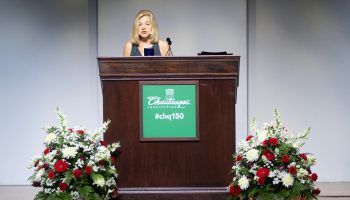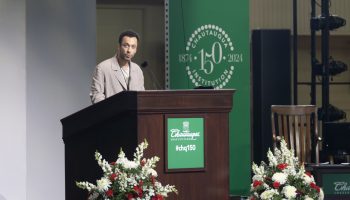NICK DANLAG – STAFF WRITER
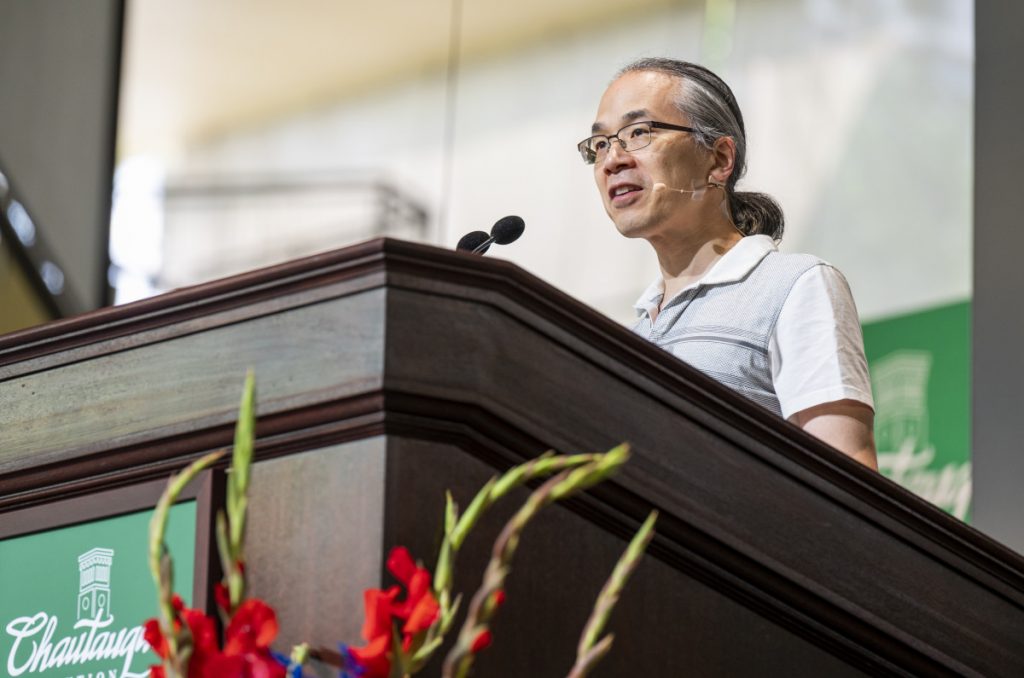
Aluminum was once worth more than gold. In 1884, the Washington Monument was capped with aluminum because of its value and durability. Yet today, the metal lines the shelves of Walmart and Wegmans.
Ted Chiang, a decorated science fiction author of works including Exhalation and Stories of Your Life, said this is a consequence of the almost-daily changes caused by the industrial revolution. The world in which parents raise their children is vastly different than the one in which they themselves were brought up.
Enter science fiction. True science fiction, Chiang said, is the literature of change.
The winner of four Nebula Awards, four Hugo Awards, four Locus Awards and the John W. Campbell Award for Best New Writer, Chiang opened Week Two of the Chautauqua Lecture Series, themed “New Frontiers: Exploring Today’s Unknowns,” at 10:30 a.m. Monday, July 5 in the Amphitheater. During his lecture, titled “Science Fiction and the Idea of the Future,” he explored the differences between fantasy and science fiction, how the industrial revolution has changed how humanity views the future, and his belief in a machine-like universe.
The differences between science fiction and other genres, Chiang said, are more than cosmetic. Some stories, such as “Star Wars,” are falsely labeled as science fiction because they have aliens and spaceships, but are really adventure tales: a young man saving a princess, defeating a dark force and returning the world to order.
This type of story, where the world is in the same state both before the beginning of the tale and again at the end, Chiang said, was common before the industrial revolution and Enlightenment.
“For me, the underlying assumption for real science fiction is the idea that arose during the Enlightenment. It’s the idea that the universe can be understood through reason,” Chiang said. “It’s the idea that the universe is a kind of machine, and if we study it carefully, we can figure out how it works.”
Chiang said that The Dead Past, a novel written by Isaac Asimov and published in the 1950s, exemplifies the nature of science fiction. This novel ends with everyone in the world gaining access to a technology that is able to look milliseconds in the past. Much to the characters’ dismay, this advancement effectively ends personal privacy.
The most important characteristic of this story, Chiang said, is that it ends at a different point than it begins, unlike traditional good-versus-evil stories like “Star Wars.” These more traditional stories usually have a message that the past was good, and that humanity needs to preserve the past.
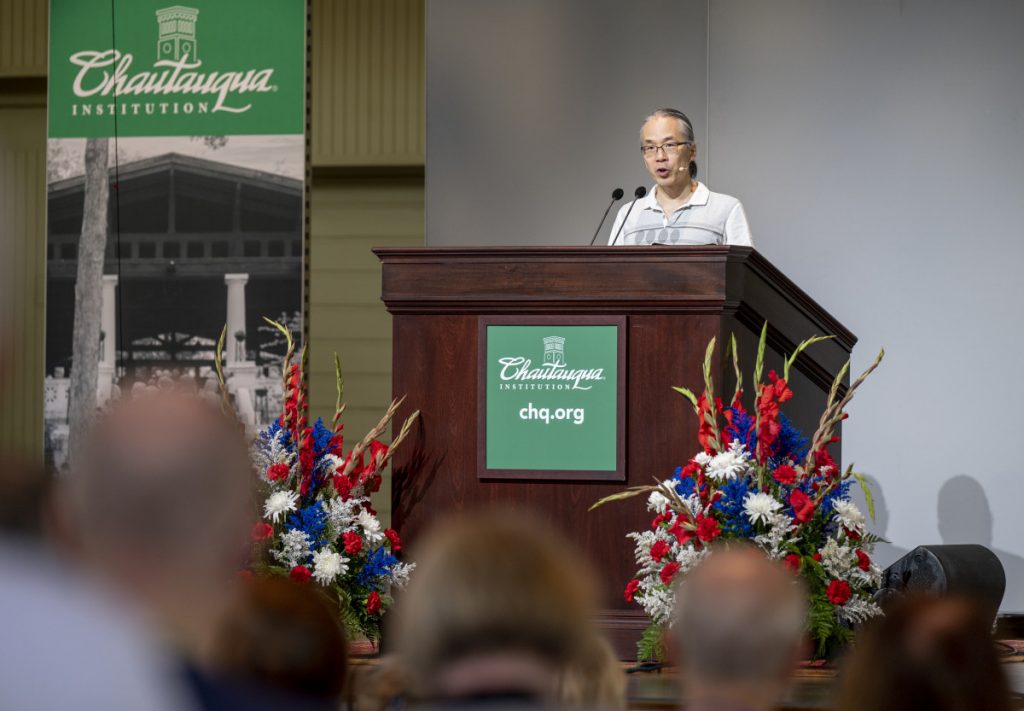
“Many critics believe that this implies a political message, and it is a conservative one because the efforts of the protagonists are directed at maintaining the status quo,” Chiang said. “The underlying message of these stories is that things were good before, and we should try to keep things that way.”
Real science fiction, on the other hand, follows another pattern, Chaing said, starting with the familiar, new technology disrupting daily life and the world changing.
Another key part of science fiction exemplified in The Dead Past is the democratization of technology, like the machine that can look into the past or, in real life, smartphones. He said that true science fiction often asks two questions: What if this technology exists, and what if everyone had it?
The availability of technology, Chiang said, is a major difference between science fiction and fantasy. He said that some people claim that the only difference between the two genres is cosmetic: they say that if The Lord of The Rings had aliens instead of elves, then it would be called science fiction.
Chiang disagrees. He then gave two stories: one where gold could be created for cheap by anyone and another where only a few people had the ability.
The difference between the two examples is the importance of the practitioner. The second example — found in the genre of fantasy — depends on the individual, with the universe choosing a particular person for a particular reason. The person may have an innate gift, or a purified soul, for example. Reasons could also include good intentions, hard work, intense concentration or personal sacrifice.
The first, which he said is more reminiscent of science fiction, requires none of these.
“None of these things are true of scientific phenomena,” Chiang said. “When you pass a magnet through a coil of wire, electric currents flow, no matter who your parents are, whether your intentions are good or bad. You don’t have to concentrate power or offer a sacrifice in order for a light bulb to turn on. Electricity doesn’t care.”
In fiction, magic typically requires individuals and responds differently to each one.
“Magic is evidence that the universe knows that you’re a person,” Chiang said. “Magic is an indication that the universe recognizes that people are different from things and that you are an individual who is different from other people.”
Science fiction, in many ways, does the opposite.
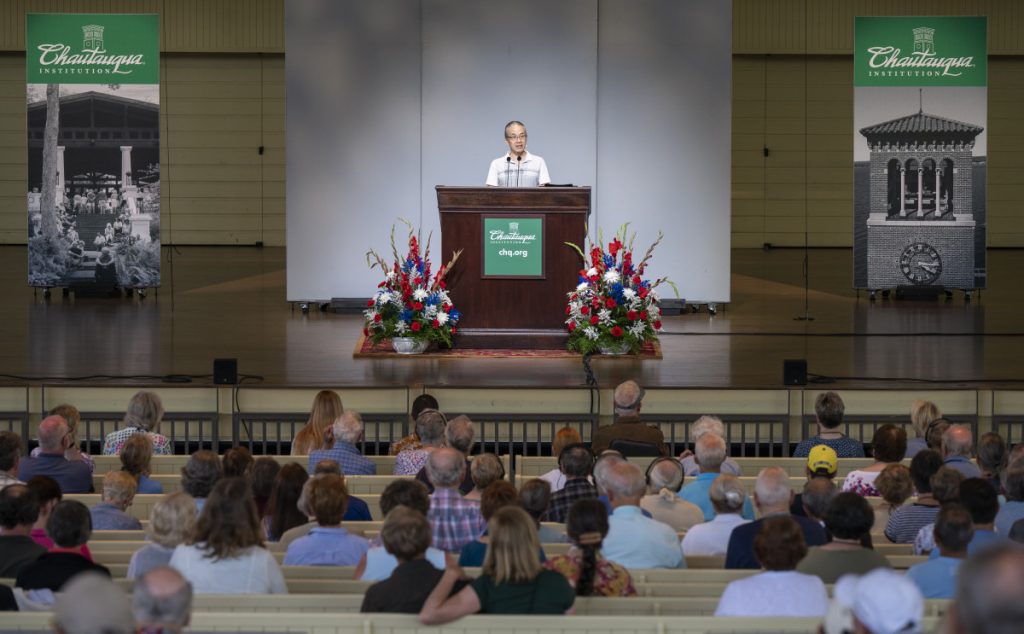
“Sometimes people say that the scientist’s way of viewing the world is cold and impersonal,” Chiang said. “I am not sure that I would agree that it’s cold, but definitely agree that it is impersonal.”
Chiang said that people, in fiction and in real life, tend to anthropomorphize the universe, thinking of it as a person, with its own will and thoughts. One such example is the idea that positive thoughts lead to positive outcomes. One author, Chiang said, wrote about a character designed after themselves, and when they wrote about bad things happening to the character, bad things happened to the author.
“It’s the idea that the universe recognizes the interpersonal, because that’s what people do,” Chiang said. “But mass production cannot be understood this way, because people do not behave this way. No one would grant a favor, once a second, all day, every day, 365 days a year.”
The idea of a lack of connection between humanity and the universe grew in Western cultures during the Enlightenment. Instead of relying on the written works of old philosophers, scientists of this era started to rely on their own experiments and looked for replicable results.
And capitalism has thrived under this philosophy.
“Capitalism excels at making people feel unimportant. Working on an assembly line takes a lot of joy out of working,” Chiang said. “This is a direct byproduct of living in a mechanistic universe. In a universe where magic works, that type of alienation cannot happen, because magical nature is inextricably tied to (the) individual.”
Chiang said that the world needs more fantasy and science fiction, as both are essential in understanding the universe and humanity, and help people understand the value of themselves and the world around them.
Matt Ewalt, vice president and Emily and Richard Smucker Chair for Education, asked Chiang, as part of the Q-and-A session, which authors should people read that exemplify science fiction.
Chiang recommended writers Greg Egan and Kim Stanley Robinson.
Ewalt also asked Chiang about science fiction’s role in inspiring a sense of awe in the reader.
The awe readers experience while reading is the same emotion that scientists feel when studying the universe, Chiang said. For many early scientists during the Enlightenment, the surprise and inspiration they felt during experiments were vastly tied to their practice of religion because they were gaining a greater understanding of their god’s creations.
And it is similar for secular scientists.
“The awe that you get from understanding the universe,” Chiang said, “is the closest thing a non-religious person can get to religious awe.”



